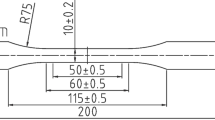Abstract
Glass matte/epoxy-reinforced composites provide high-quality electrical insulation, structural integrity, and environmental protection in solid cast transformers. The thermal expansion characteristics of those composites are very important; the thermal expansion must be compatible with the conductor of the transformer in order to minimize stresses and prevent decohesion between the composite and the copper. The glass matte orientation and loading greatly influence the thermal expansion characteristics of the composite. A section was removed from a glass matte/bisphenol A epoxy-insulated, copper conductor wound cylindrical transformer coil. The linear expansion coefficients of the glass matte/epoxy composite were determined by differential dilatometry for three mutually perpendicular orientations with respect to the cylindrical coil. The expected reduction in thermal expansion of the epoxy in the tangential and axial directions due to the glass matte, which produced improved thermal expansion compatibility with the copper windings, was demonstrated. The measured linear thermal expansion coefficients were compared with theoretical values derived from a model for thermal expansion of a two-dimensional isotropic composite filled with fibers randomly oriented in a plane. An alternate composite system used for solid cast coil transformers, consisting of a cycloaliphatic resin filled with silica flour, was also investigated for comparison.
Similar content being viewed by others
References
R. E. Lowrie, in Modern Composite Materials, L. J. Broutman and R. H. Krock, eds. (Addison-Wesley, Reading, Mass., 1967), p. 281.
Ciba-Geigy, Casting and Impregnating Resin Systems, Publ. No. 34199/2/e (Ciba-Geigy Corp., 1980).
N. H. Polakowski and E. J. Ripling, Strength and Structure of Engineering Materials (Prentice-Hall, Englewood Cliffs, N.J., 1966), p. 103.
T. A. Hahn and R. K. Kirby, in Thermal Expansion Symposium Program and Summary Proceedings (Corning Glass Works, Corning, N.Y., 1971).
W. J. Kraft and R. M. Christensen, in Environmental Effects on Composite Materials, Vol. 2, G.S. Springer, ed. (Technomic, Westport, Conn., CT, 1984), pp. 330–347.
R. M. Christensen, Mechanics of Composite Materials (John Wiley, New York, 1979), pp. 74–80.
Author information
Authors and Affiliations
Rights and permissions
About this article
Cite this article
Dudek, J.A., Kargol, J.A. Linear thermal expansion coefficients for an epoxy/glass matte-insulated solid cast transformer. Int J Thermophys 9, 245–253 (1988). https://doi.org/10.1007/BF00504244
Issue Date:
DOI: https://doi.org/10.1007/BF00504244




